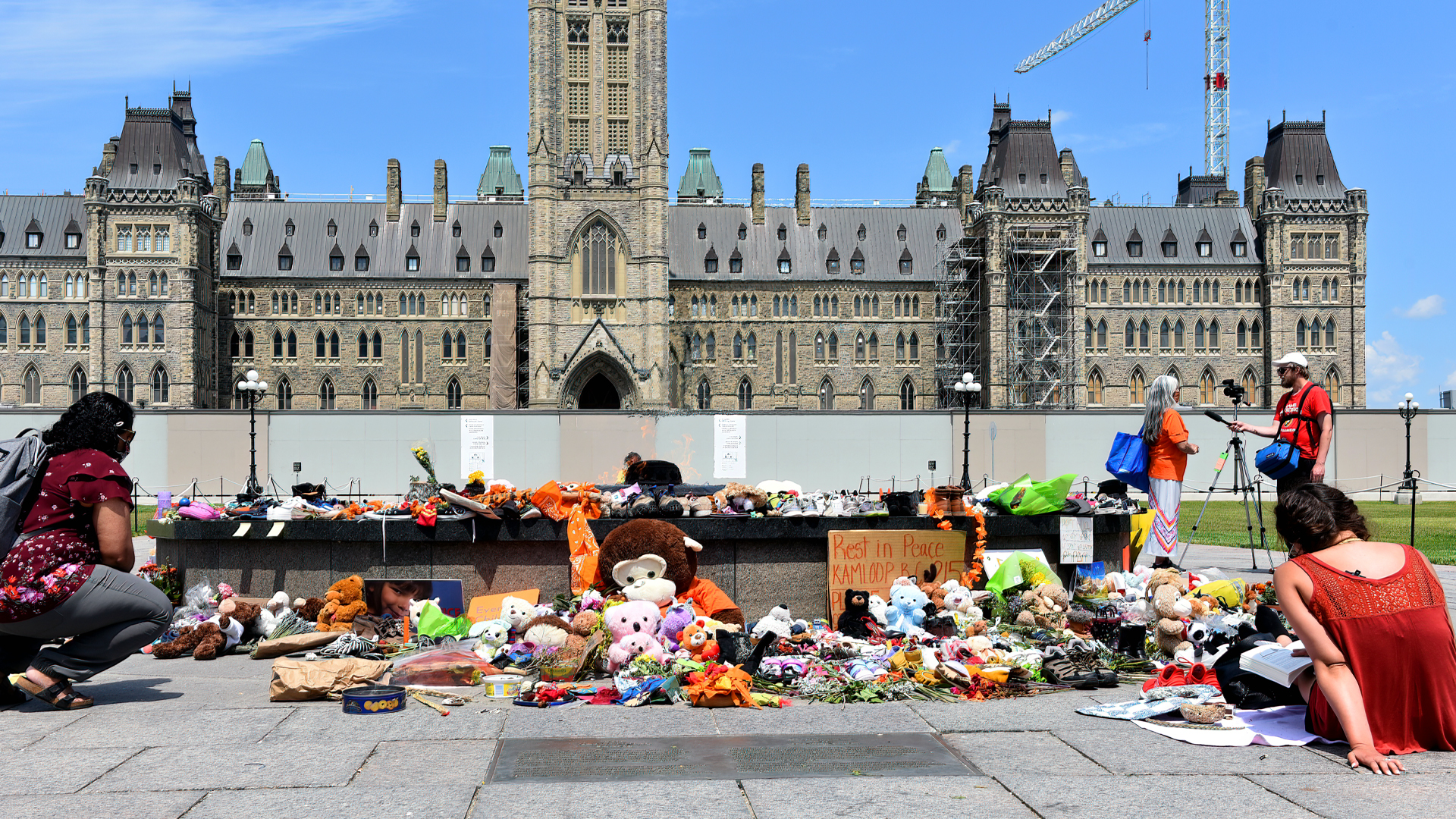Earlier this month, a small group of Canadian lawyers submitted to the incoming chief prosecutor of the International Criminal Court (ICC) a request that he open a preliminary examination on a proprio motu (one’s own initiative) basis of the unmarked graves of 215 Indigenous students of the now closed Kamloops Indian Residential School in British Columbia.
On the face of it, the news of the request put to Karim Khan is quite appealing to some and seemingly absurd to others. Reflecting the frustration that many Canadians feel with the slow uptake and follow-through of the recommendations made by the Truth and Reconciliation Commission in 2015, the request to the ICC seems to demand attention and external pressure, possibly even external intervention to hold guilty parties to account for the horrendous treatment of vulnerable children and their families. To those who know more than the average citizen about the ICC, the request may seem detached from reality and the situation seems initially obviously beyond the jurisdiction of the court.
Requests for proprio motu investigations into ICC crimes (crimes against humanity, war crimes, genocide) committed in ICC member states can be made by anyone, and many such requests cover acts not within the court’s jurisdiction, either because the requestors do not understand the limited jurisdiction of the court or their only goal is the attention such a public request could garner, for political reasons and/or to highlight the seriousness of concern for the requestors. Unlike referrals made by states or the United Nations Security Council (UNSC), to open a formal investigation after completing a preliminary examination on a proprio motu basis, the ICC prosecutor must receive approval from pre-trial chamber judges who consider jurisdiction and gravity.
In their communication to the chief prosecutor, the lawyers point to the principle of complementarity, which respects the primary jurisdiction of states and has two aspects. The principle sees the court as one of last resort. It cannot act if a state is prepared to hold its own trials. It can only act if a state is unable or unwilling to do so. The lawyers argue the principle of complementarity would not be violated because Canada is not pursuing its own processes.
The second aspect is positive complementarity, where the court acts not to prosecute but to help the state through encouragement, helping to develop co-operative strategies and possibly even assist in national prosecutions.
In this case, the lawyers argue that the “Prosecutor can, acting within the mandate provided by the Statute, encourage the State concerned to initiate national proceedings, help develop cooperative anti-impunity strategies, and possibly provide advice and certain forms of assistance to facilitate national efforts.” They argue that it’s in the interest of justice for the prosecutor to opening a preliminary examination proprio motu to encourage the Canadian government and the Vatican to initiate domestic proceedings, provide advice and certain forms of assistance to facilitate national efforts and, most importantly, provide baseline levels of scrutiny over the government of Canada and the Vatican.
The court has received the request and has opened a file to determine whether or not to accept it, according to Jonathan Denis, former attorney general of Alberta and one of the original complainants on the communication. Karim Khan assumes the post of chief prosecutor on June 16.
It would seem that the communication to the chief prosecutor and the accompanying media release can have possibly both positive and negative consequences for those interested in justice for victims of the Indian Residential School system in Canada.
There is already strong and growing outrage over the discovery of the children’s bodies and what it means, and this request could add another layer of urgency, seriousness and fortitude to the current attention focused on past abuses inflicted on Indigenous children. Internationally recognized human rights law expert William Schabas says the discovery of the unmarked burial site, which has sent shockwaves across the world, will have a negative impact on Canada’s reputation as a leading human rights defender. It is possible that news of the request to the ICC will impart or threaten further reputational damage. This could be a positive development for those who want to see Canada feel the pain of not doing more to address its colonial history.
The communication also highlights the fact that there may be criminal responsibility for the acts of atrocity committed against these children and in the continued cover-up of the acts, which has never been addressed. So far, there has been no individual criminal accountability for the abuse inflicted on these children and their families, and communities and information and evidence have been hard to come by for Indigenous groups, who want to know exactly what happened.
The request also highlights the possible contemporary contributions to the harm and criminal activity of members of the Vatican, yet unknown, who are suspected of aiding in a policy of covering up the past, refusing to give access to necessary documentation of names and causes of death, etc.
There are also possible negative consequences. The possible negative consequences arise from the fact that this request to the chief prosecutor seems unlikely to gain traction with the court. While there may be a case for claiming the actions and conditions inflicted were crimes against humanity, the jurisdiction of the ICC covers events which happen after July 1st, 2002, long after the last residential schools had closed. The Kamloops Indian Residential School closed in 1978. While the authors of the communication acknowledge this, they suggest that the temporal jurisdiction of the court can be extended in this situation because acts intended to cover-up crimes committed in the past contributed to ongoing, continued criminality and extend the length of the alleged crimes.
This approach to extending the reach of the court is novel. Some would say it doesn’t reflect a proper interpretation of the Rome Statute or the intentions of the drafters. Others might say this is a question for the pre-trial chamber to determine (if it ever comes to that). Nevertheless, it seems far-fetched and unlikely that the prosecutor will pursue this situation. The court’s caseload is already overstretched with situations. The temporal jurisdiction of the court was established so that crimes committed prior to the establishment of the court or to the accession of a state to the Rome Statute would not fall within the jurisdiction of the court, and opening an investigation into this situation could feed into the fears of some states that the court sees its mandate as broader than it should be. Even if such a legal justification for jurisdiction could be made, it seems unlikely the ICC would be interested in alienating western nations who have colonial and racist histories, especially beginning with one that has been a strong supporter. (Arguably, it is possible that one could argue the opposite, that this may be the situation that allows the court to demonstrate it is not a court of western imperialism.)
What this likely means is that the request and accompanying media release present possibilities that aren’t really there, miscommunicating the reach of the ICC, possibly raising false hopes and possibly distracting from work that needs to happen here at home without waiting or hoping for external pressure or assistance.
Denis says that the ideal outcome of the communication would be for “the ICC to appoint a fully impartial and independent body to investigate.” Many in Canada and abroad can agree an investigation of abuses and responsibility should happen. The Canadian government should support one. The Vatican and the Canadian government should assist in any way they can to provide pertinent evidence. It seems unlikely, however, that the ICC will extend pressure or assistance unless the Canadian government itself requests it – and even then it would be a stretch to make a case for positive complementarity based on any alleged crimes meeting both the gravity threshold and the court’s temporal jurisdiction.









